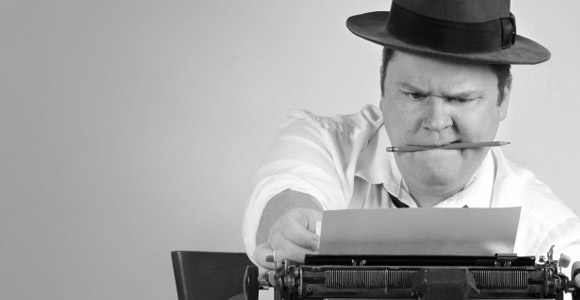Getting started

One thing and one thing only has ever driven me to write and complete an assignment.
Getting paid.
Those books and “writing hobby” magazines telling you to “WRITE! WRITE! WRITE!” are all well and good (though they’re mostly fulla crap) but there’s nothing like a check to get you going.
I am a terrible example for wannabe writers as, after high school, I never used to write before I got regular paying jobs. Heck, I never learned to type!
I would think up ideas for stories all the time but never write anything down. When trolling for work I never once had any prepared material. I just went to interviews and cons and talked a good talk.
But once the work began to pay it was hard to get my foot off the accelerator. I now had the luxury of spending my days writing and collecting research and building stories (and, trust me,that all sounds far more wonderful than it really is) and someone else was footing the bill.
Even today it’s like root canal to sit and write anything on spec or to write lengthy proposals or outlines.
When I first got to CrossGen I was horrified to learn that I would have to write exhaustive plot synopses and detailed outlines as well as entries to the CG “bible”. This was all “make work” by a non-comics wonk high in the company’s chain of command. At an early meeting I confessed that I really didn’t write good outlines or proposals and preferred to save my energy for actual scripts. The wonk smugly told me that “I’d learn as I got more experience.” That inspired a roar of laughter from my fellow writers around the table.
No one put it better than Archie Goodwin, “Chuck writes a lousy proposal but he always delivers on the story.”
So, my advice on getting started and keeping the fires burning?
- Don’t feel that you have to start at the beginning and work forward. EVERYone works differently and approaches writing differently. I usually come up with several very strong visual scenes first and work out from there. Batman tied to a harbor buoy as the tide rises and the sharks are circling. Now, how to get there? If you have a great scene, don’t be afraid to write that first and worry about the preceding story later.
- Don’t be afraid to start a story without knowing the ending. At the outset, unless your story is auto-biographical, you don’t know the situations or characters well enough. As you learn more, a plausible, un-contrived ending will grow from that knowledge.
- No idea or concept is so stupid that you can’t make it work. I call this The Kirby Principle. Jack Kirby was a fearless creator who could sell the dumbest idea you can think of. Come on, the Silver Surfer? Modok? The Mother Box? Have faith in your idea and figure out what’s needed to make it work dramatically. The guy who thought of a story where people are trapped on a city bus that will explode if it goes below 50 mph hasn’t checked the sofa cushions for change lately.
- Don’t rush it. Write in snippets if you have to. Don’t set ridiculous deadlines you’ll never keep.
- Immerse yourself. It’s easy at the outset of a project to dive in and write like a madman. But then life interrupts and going back to the now-cold stuff you wrote before seems like the dullest task in the world. Well, if you’re gonna be a pro and have a career then you’re gonna have to write even when it’s the last thing in the world you want to do. MAKE yourself jump into the frigid-cold, deep end of the pool. You’ll be surprised how quickly the work warms up again and once more you’re blazing and at home in your initial concepts. Which leads me to…
- The simplest and yet best advice I ever got. I read an interview with an old Hollywood hand at screenwriting who said that he never wrote down his last idea of the day. That way he knew where he was going to start the next day and could get back to work without excuses or hesitation. So simple and yet it’s made my life easier on so many occasions.

No comments:
Post a Comment